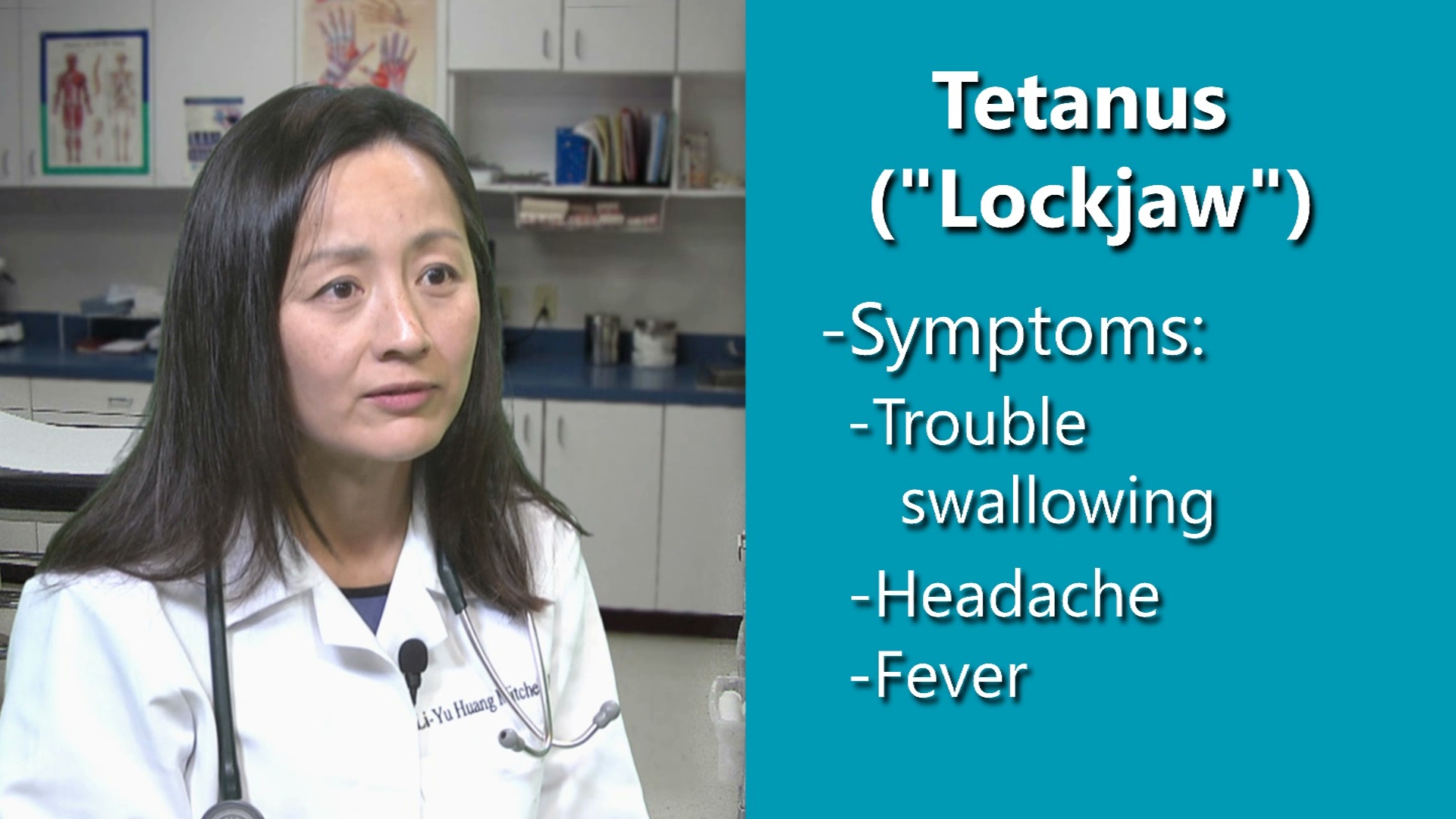April 1, 2019
The bottom line: Tetanus is a serious bacterial infection. Commonly known as “lockjaw,” tetanus causes painful muscle spasms in the jaw, neck, and stomach area, as well as other serious symptoms. If left untreated, tetanus can be fatal. Fortunately, several vaccines protect people of all age groups against this infectious disease.

An open wound is a painful occurrence for anyone – but without protection, that cut or burn can bring something more serious: tetanus.
“Bacterial spores of tetanus are everywhere in the environment – in the dirt, in the dust, and feces.” said Tyler family physician and Texas Medical Association (TMA) physician leader Li-Yu Mitchell, MD. The spores – Clostridium tetani – can get inside the body through broken skin caused by objects like nails, burns, animal bites, and even a bike accident.
“Step on a dirty nail or needle, suffer a burn or crush injury, or simply have a wound that is contaminated with dirt, feces, or spit, and you have a recipe for disaster,” said Dr. Mitchell in a video on the TMA YouTube channel. You can contract tetanus, a bacterial infection commonly known as lockjaw.
Tetanus can cause painful spasms in jaw muscles and muscles throughout the body – especially in the stomach area. Patients who contract tetanus also experience muscle stiffness, trouble swallowing, headache, fever, difficulty breathing, and changes in blood pressure and heart rate.
According to Dr. Mitchell, symptoms can show up in as early as three days to three weeks.
Tetanus brings its fair share of complications too. Patients can experience uncontrolled tightening of the vocal cords, and spasms strong enough in some cases to break bones. Some patients can develop blood clots or pneumonia. These complications can lead to death without medical treatment.
Tetanus cases in the United States started to decline in 1900 when physicians spoke out about better wound care. The introduction of tetanus vaccines in the 1940’s caused the number of cases to plummet, from 600 on average to about 30 today, according to the Centers for Disease Control and Prevention (CDC).
People of all ages can protect themselves from tetanus with a vaccine. The vaccine recommended depends on a person’s age. Young children usually receive the DTaP (diphtheria, tetanus, and acellular pertussis) vaccine or the DT (diphtheria-tetanus) in five advised doses: at 2, 4, and 6 months; between 15 and 18 months; and between 4 and 6 years of age. The CDC recommends preteens age 11 to 12 get a Tdap (tetanus, diphtheria, and pertussis) or Td booster (tetanus-diphtheria). Adults should get a booster every 10 years.
The CDC reports tetanus cases in the United States today occur in unvaccinated adults, or adults who did not get a booster shot. The vaccine is highly effective, according to Dr. Mitchell.
In addition to getting vaccinated, the CDC recommends people wash hands with soap and water frequently, using an alcohol-based hand rub if washing is not possible. Any break in the skin should also be quickly washed and cared for.
“We all get cuts and scrapes. It happens. Protect yourself and your family against tetanus,” said Dr. Mitchell.
This release is part of a monthly TMA series highlighting contagious diseases that childhood and adult vaccinations can prevent. Some diseases covered thus far are:
TMA designed the series to inform patients of the facts about these diseases and to help them understand the benefits of vaccinations to prevent illness. Visit the TMA website to see efforts to raise immunization awareness and how funding is used to increase vaccination rates.
TMA is the largest state medical society in the nation, representing nearly 53,000 physician and medical student members. It is located in Austin and has 110 component county medical societies around the state. TMA’s key objective since 1853 is to improve the health of all Texans.
--30--
TMA Contacts: Brent Annear (512) 370-1381; cell: (512) 656-7320; email: brent.annear[at]texmed[dot]org
Marcus Cooper (512) 370-1382; cell: (512) 650-5336; email: marcus.cooper[at]texmed[dot]org
Connect with TMA on Twitter, Facebook, and Instagram.
Check out MeAndMyDoctor.com for interesting and timely news on health care issues and policy.